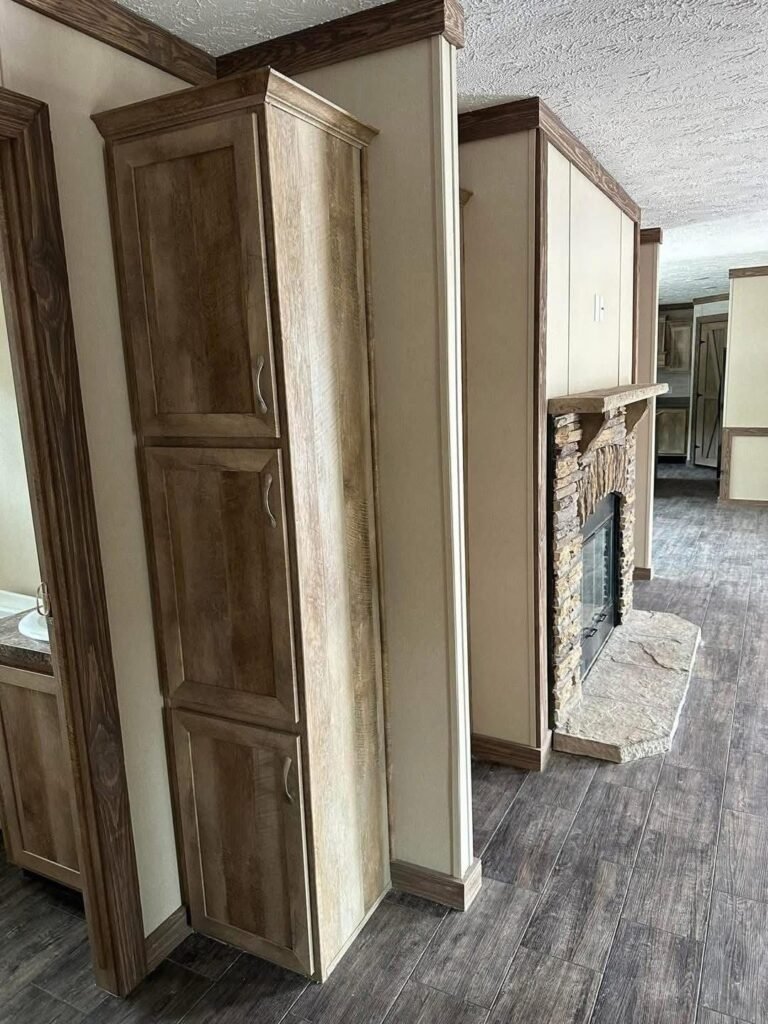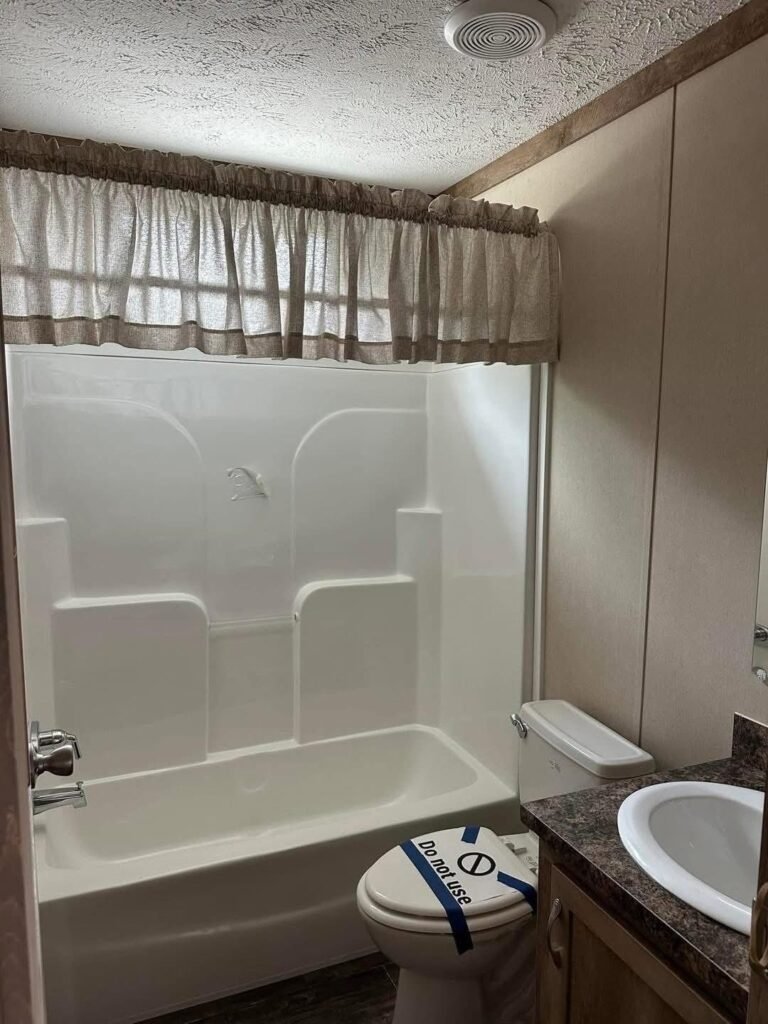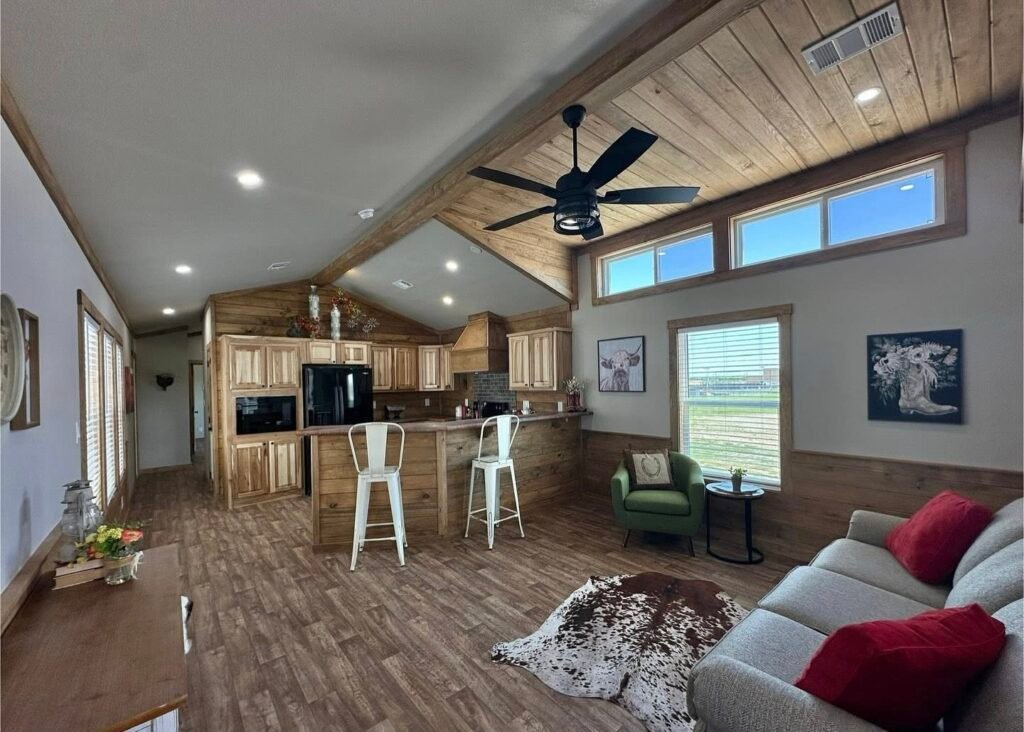Uncategorized
Modular Homes and Construction – Understanding Modern Manufactured Housing
Modular home construction represents one of the most significant innovations in the housing industry, combining the quality and customization of traditional site-built homes with the efficiency and cost advantages of factory construction. Unlike traditional manufactured homes, modular homes are built to the same building codes as site-built homes and are designed to be permanently installed on foundations, making them indistinguishable from conventional homes once completed.
The modular construction industry has experienced tremendous growth, with the market expanding by over 8% annually as builders, buyers, and communities recognize the advantages of factory-built construction [1]. This growth is driven by factors including faster construction timelines, improved quality control, reduced waste, and the ability to build in controlled environments regardless of weather conditions.
Modern modular homes challenge traditional perceptions of factory-built housing, offering architectural designs, luxury features, and customization options that rival or exceed those available in site-built homes. From simple starter homes to elaborate custom estates, modular construction can accommodate virtually any design preference while providing the efficiency and quality advantages that make this construction method increasingly popular.
Understanding Modular Construction Methods and Processes
Factory Construction Advantages
Controlled environment construction eliminates weather delays and provides consistent working conditions that result in better quality control and faster construction timelines. Factory environments allow for precise construction techniques, better material storage, and specialized equipment that improves both efficiency and quality.
Quality control systems in modular construction facilities include multiple inspection points throughout the construction process, ensuring that each component meets strict standards before moving to the next stage. This systematic approach to quality control often results in fewer defects and better overall construction quality than site-built homes.
Material efficiency in factory construction reduces waste through precise cutting, bulk purchasing, and systematic material management that minimizes both costs and environmental impact. The controlled environment also protects materials from weather damage and theft that can affect site-built construction.
Construction Timeline and Process
Design and planning phases for modular homes typically take 2-4 weeks, during which architectural plans are finalized, permits are obtained, and construction schedules are established. This planning phase is crucial for ensuring that all components fit together properly during final assembly.
Factory construction usually takes 4-8 weeks depending on the complexity and size of the home, with multiple homes often being built simultaneously in different stages of completion. This parallel construction process significantly reduces overall construction time compared to sequential site-built construction. Modular home builders
Site preparation and installation occur simultaneously with factory construction, including foundation preparation, utility connections, and site access improvements. The final installation and finishing process typically takes 1-2 weeks once the modules arrive on site.
Quality Standards and Building Codes
Building code compliance for modular homes requires adherence to the same International Building Code (IBC) standards as site-built homes, ensuring structural integrity, safety, and energy efficiency that meets or exceeds local requirements.
Third-party inspections throughout the construction process provide independent verification of quality and code compliance, with inspections occurring both during factory construction and after on-site installation.
Warranty coverage for modular homes typically includes both manufacturer warranties on construction and materials, plus additional warranties from builders and installers that provide comprehensive protection for homeowners.
Types of Modular Construction and Applications
Residential Modular Homes
Single-family modular homes range from simple starter homes to elaborate custom estates, with virtually unlimited design possibilities that can accommodate any architectural style or personal preference. Modern modular construction can replicate traditional styles like Colonial, Victorian, or Craftsman, as well as contemporary designs with open floor plans and luxury features.
Multi-family modular construction includes duplexes, townhomes, and small apartment buildings that provide efficient solutions for rental properties and affordable housing developments. The speed and efficiency of modular construction make these projects particularly attractive for developers and investors.
Custom modular homes offer the ultimate in personalization, with builders working directly with homeowners to create unique designs that reflect individual preferences and lifestyle needs. Custom modular construction can incorporate luxury features, unique architectural elements, and specialized systems that rival the most expensive site-built homes.
Commercial and Institutional Modular Buildings
Modular classrooms provide quick solutions for school districts facing enrollment growth or facility needs, with temporary and permanent classroom buildings that can be installed quickly and relocated as needed. These buildings meet all educational facility requirements while providing cost-effective expansion options.
Office and commercial buildings use modular construction for everything from small office buildings to large commercial complexes, providing businesses with quick occupancy and flexible expansion options that traditional construction cannot match.
Healthcare and institutional facilities benefit from modular construction’s ability to meet strict regulatory requirements while providing faster construction timelines that minimize disruption to ongoing operations.
Specialized Modular Applications
Disaster relief housing utilizes modular construction’s speed and efficiency to provide temporary and permanent housing solutions for communities affected by natural disasters or other emergencies.
Military and government facilities use modular construction for barracks, offices, and specialized facilities that can be quickly deployed and relocated as mission requirements change.
Recreational and seasonal buildings include vacation homes, hunting cabins, and seasonal facilities that benefit from modular construction’s ability to build in remote locations with minimal site disruption.
Leading Modular Home Manufacturers and Builders
National Modular Home Manufacturers
Clayton Homes represents one of the largest modular home manufacturers in the United States, offering a wide range of home designs from affordable starter homes to luxury custom builds. Clayton’s extensive dealer network and financing options make modular homes accessible to a broad range of buyers.
Champion Homes specializes in both manufactured and modular construction, with a focus on energy efficiency and modern design features that appeal to contemporary homebuyers. Champion’s modular division offers customization options and architectural styles that compete directly with site-built homes.
Westchester Modular Homes focuses on luxury modular construction with high-end finishes and custom design capabilities that serve affluent markets seeking quality and speed in home construction.
Regional and Specialized Builders
Regional modular builders often provide more personalized service and local expertise, with deep understanding of local building codes, climate considerations, and market preferences that can result in better outcomes for homeowners.
Custom modular specialists focus on high-end, fully customized homes that push the boundaries of modular construction, incorporating luxury features and unique designs that demonstrate the full potential of factory-built construction.
Commercial modular contractors specialize in non-residential applications, with expertise in educational, healthcare, and commercial construction that requires specialized knowledge and capabilities.

Selecting the Right Modular Builder
Experience and reputation should be primary considerations when selecting a modular builder, with established track records of successful projects and satisfied customers providing confidence in their capabilities.
Design capabilities vary significantly among builders, with some focusing on standard plans while others offer extensive customization options that can accommodate unique requirements and preferences.
Local presence and support are important for ongoing service and warranty support, as builders with local operations can provide better responsiveness and understanding of local conditions and requirements.
Benefits and Advantages of Modular Construction
Speed and Efficiency Benefits
Faster construction timelines represent one of the most significant advantages of modular construction, with homes typically completed in 50-75% less time than comparable site-built construction. This speed advantage provides benefits for both builders and homeowners, reducing carrying costs and allowing earlier occupancy.
Weather independence allows modular construction to proceed regardless of weather conditions, eliminating delays that commonly affect site-built construction and providing more predictable completion schedules.
Parallel construction processes enable site preparation and factory construction to occur simultaneously, further reducing overall project timelines and allowing for more efficient project management.
Quality and Performance Advantages
Controlled construction environment provides better working conditions for craftsmen and protection for materials, resulting in higher quality construction and fewer defects than typical site-built homes.
Precision manufacturing using specialized equipment and jigs ensures consistent quality and precise fit of components, reducing gaps, alignment issues, and other construction defects that can affect performance and appearance.
Multiple inspection points throughout the construction process provide quality assurance that exceeds typical site-built construction, with both factory inspections and on-site inspections ensuring compliance with all applicable standards.
Cost and Value Benefits
Reduced construction costs result from factory efficiencies, bulk material purchasing, and reduced labor costs that can provide savings of 10-20% compared to site-built construction of similar quality.
Predictable pricing with fixed contracts eliminates the cost overruns and change orders that commonly affect site-built construction, providing budget certainty for homeowners and builders.
Energy efficiency features are easier to incorporate in factory construction, with better insulation installation, air sealing, and quality control that result in lower operating costs for homeowners.
Challenges and Considerations in Modular Construction
Transportation and Site Limitations
Transportation constraints limit the size and configuration of modular components, requiring careful planning to ensure that modules can be safely transported to the building site. These constraints can affect design options and may require special permits or routing for oversized loads.
Site access requirements must accommodate large delivery trucks and cranes needed for module installation, which can be challenging for sites with limited access or difficult terrain.
Local zoning and code restrictions may limit or prohibit modular construction in some areas, requiring careful research and sometimes advocacy to gain approval for modular projects.
Design and Customization Limitations
Structural constraints of modular construction may limit some architectural features or require special engineering solutions that can add cost and complexity to projects.
Standardization pressures in factory construction can limit customization options compared to site-built construction, though this limitation is decreasing as manufacturers develop more flexible construction systems.
Integration challenges can arise when combining modular construction with site-built components, requiring careful coordination and specialized expertise to ensure proper integration.
Market and Financing Considerations
Financing challenges may arise as some lenders are unfamiliar with modular construction or have restrictions on factory-built homes, though this is improving as modular construction becomes more mainstream.
Resale value concerns persist in some markets where buyers are unfamiliar with modular construction, though studies show that well-built modular homes typically appreciate at rates similar to site-built homes.
Insurance considerations may require specialized coverage or higher premiums in some areas, though most major insurers now treat modular homes the same as site-built homes for coverage purposes.

The Future of Modular Construction
Technological Innovations
Advanced manufacturing techniques including robotics, 3D printing, and computer-controlled cutting systems are improving precision and efficiency in modular construction while reducing costs and expanding design possibilities.
Building information modeling (BIM) and other digital design tools are improving coordination between design, manufacturing, and installation phases, reducing errors and improving project outcomes.
Sustainable construction practices are being integrated into modular construction, including renewable energy systems, sustainable materials, and waste reduction techniques that appeal to environmentally conscious buyers.
Market Growth and Expansion
Increased acceptance of modular construction among buyers, lenders, and communities is driving market growth and expanding opportunities for modular builders and manufacturers.
Affordable housing applications are utilizing modular construction’s cost and speed advantages to address housing shortages and provide quality housing at lower costs than traditional construction methods.
Commercial market expansion is seeing increased use of modular construction for schools, healthcare facilities, and commercial buildings that benefit from faster construction and predictable costs.
Industry Development and Standards
Improved building codes and standards are being developed specifically for modular construction, providing clearer guidelines and reducing regulatory barriers that have historically limited modular construction.
Professional development and training programs are improving the skills and knowledge of modular construction professionals, resulting in better project outcomes and increased industry credibility.
Industry consolidation and standardization are improving efficiency and quality while providing consumers with more reliable options and better warranty protection.
Frequently Asked Questions About Modular Homes and Construction
How do modular homes differ from manufactured homes?
Modular homes are built to the same building codes as site-built homes and are designed for permanent installation on foundations, while manufactured homes are built to HUD standards and can be relocated. Modular homes typically have higher resale values and financing options similar to site-built homes.
Are modular homes as durable as site-built homes?
Yes, modular homes built to IBC standards are as durable as site-built homes and often exceed site-built quality due to controlled construction environments and multiple inspection points. Many modular homes come with warranties that match or exceed those available for site-built homes.
How much do modular homes cost compared to site-built homes?
Modular homes typically cost 10-20% less than comparable site-built homes due to factory efficiencies and reduced construction time. However, costs vary significantly based on design complexity, finishes, and local market conditions.
Can modular homes be customized like site-built homes?
Modern modular construction offers extensive customization options, with many builders providing fully custom design services that can accommodate unique requirements and preferences. While some structural limitations exist, most architectural styles and features can be incorporated into modular designs.
Do modular homes appreciate in value like site-built homes?
Studies show that well-built modular homes typically appreciate at rates similar to site-built homes in the same markets. The key factors affecting appreciation are location, quality of construction, and local market conditions rather than the construction method.

Conclusion: The Growing Role of Modular Construction in Modern Housing
Modular construction represents a significant evolution in the housing industry, offering advantages in speed, quality, cost, and sustainability that make it an increasingly attractive option for both residential and commercial applications. As technology continues to improve and market acceptance grows, modular construction is positioned to play an increasingly important role in addressing housing needs and construction challenges.
The key to success with modular construction is understanding its capabilities and limitations, selecting experienced builders and manufacturers, and ensuring that projects are properly planned and executed. When done well, modular construction can provide superior value and quality compared to traditional construction methods while offering faster completion and more predictable outcomes.
As the construction industry continues to evolve, modular construction offers solutions to many of the challenges facing traditional construction, including labor shortages, weather delays, quality control issues, and cost overruns. For buyers, builders, and communities seeking efficient, high-quality construction solutions, modular construction provides proven alternatives that deliver excellent results.
Looking for larger spaces? Explore our 4 bedroom mobile homes for rent.
Save money with cheap mobile homes for rent near me.
Browse listings of mobile homes for rent by owner.
Shop the stylish and spacious 4 bed 2 bath tiny home for sale.
References
[1] Modular Building Institute. “2025 Industry Growth Report.” https://www.modular.org/industry-statistics
[2] National Association of Home Builders. “Modular Construction Analysis 2025.” https://www.nahb.org/modular-construction
[3] International Code Council. “Modular Construction Standards and Guidelines.” https://www.iccsafe.org/modular-construction
For information about modular home options and construction services, contact TrailerHousesForRent.com at (657) 224-3173 to explore our modular and manufactured home solutions.

